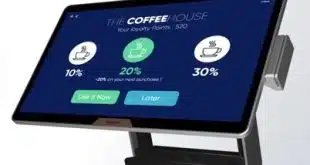Payvment Inc., a San Francisco startup whose shopping-cart software has been enabling transactions for storefronts on Facebook for the past six months, plans to use $1.5 million in new funding to add engineers and expand its network beyond the massive social network. Christian Taylor, the company’s chief executive, tells Digital Transactions News he expects by the end of the year to embrace other social-network sites as well as individual retailer sites and international forums. “We have the technology to turn these networks into a shopping mall,” he says.
Payvment, which currently boasts a head count of nine, last week closed on a Series A funding round led by BlueRun Ventures, a venture-capital firm said to have been an early investor in PayPal Inc. The funding in some respects came as recognition of how Payvment has proven the case for shopping on Facebook, a site that attracts more than 400 million users, Taylor says. At the launch of Payvment’s product in November, “it was still up in the air if shopping was going to be a viable business on Facebook,” he says. “In a short period of time, it was not only proven to us but to everyone else.” More than 250,000 online shoppers used Payvment's cart in its first four months, the company says, and more than 20,000 merchants have now adopted it.
Payvment’s software, which is free to merchants and can be integrated by copying a single line of code, lets online shoppers accumulate merchandise from a variety of Web sites or storefronts and then pay for all of it with a single checkout. The company says its product also reduces shopping-cart abandonment, an age-old problem in e-commerce, by letting consumers keep merchandise in the cart even after they’ve left a site.
Payvment’s code enables communication not just between the cart and the merchant, but between the cart and all other merchants using it. That means consumers can select goods from any merchant in the network, including those on Facebook, and then leave those sites and check out later with a single transaction. Pricing will remain free for the foreseeable future, Taylor says, with revenue developing from “partnerships” he plans to forge with social sites and individual retailers.
The startup was one of the first developers to take advantage of new application programming interfaces from PayPal. A unit of eBay Inc., PayPal officially unveiled the APIs—and opened its global payments platform to developers—in November. Payvment started out using PayPal’s so-called parallel-payments API, which allows it to keep track of which items came from which merchant and then distribute payments accordingly. Payvment sends a receipt to the shopper and an e-mail to each merchant with shipping or downloading instructions.
The company is still using the API, but because it requires that merchants accept PayPal and that shoppers have PayPal accounts, Taylor says his team worked with the processor to add a capability to accept credit and signature-debit cards directly, with each merchant still appearing as the merchant of record. “We went to PayPal and said, ‘This [API] is great, but some people just don’t have PayPal,’” Taylor recalls.
Now the company may start looking at other payment methods, as well, Taylor says, including the new open APIs MasterCard Inc. announced on Tuesday it will introduce in the fourth quarter (Digital Transactions News, May 25). “The more [payment methods] we can integrate, the easier we can make it for people,” Taylor says. The backing of a network like MasterCard, he says, could come in handy for Payvment’s planned international expansion. He adds that PayPal has discussed with him more APIs it plans to introduce, though he can’t give details.
For now, Payvment will focus on building out its beachhead on Facebook while starting talks with other social networks. One key advantage, Taylor says, is that Payvment’s product requires little or no tweaking to work on other social sites. “It’s always been plug-and-play for networks,” he says. “We never had a goal of being a company that just sat on Facebook.”
Still, Facebook is where the action is right now. To help goose sales for Facebook storefronts, Payvment last month introduced a function that lets merchants offer discounts and e-coupons to users who choose to become “fans.” On Facebook, users can become fans of an organization or brand by clicking on a so-called Like button, but “Facebook’s never given anyone an incentive to click that Like button,” Taylor says. The new service, he says, didn’t take long to drive up fan bases for merchants. “It was great to see the results literally instantly,” he says.






